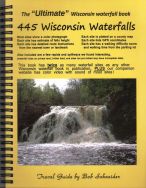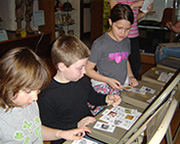
|
News at MCLHR
April 25 History Program: "Shop Talk: History & Memories of the Milwaukee Road Shops in Tomah" The Monroe County Local History Room & Museum presents: “Shop Talk: History & Memories of the Milwaukee Road Shops in Tomah,” a public program to be held on Thursday, April 25th at 7pm at the Sparta United Methodist Church... Click here for more
History Room closed Jan. 16-22. Reopens Jan. 23.
|
Survivor: Pioneer Farm LifeTitle: "Survivor: Pioneer Farm Life"
Goals:
Social Studies Performance Standards Related to the Program Grade 4 A.4.4 Describe and give examples of ways in which people interact with the physical environment, including use of land, location of communities, methods of construction, and design of shelters A.4.6 Identify and distinguish between predictable environmental changes, such as weather patterns and seasons, and unpredictable changes, such as floods and droughts, and describe the social and economic effects of these changes A.4.7 Identify connections between the local community and other places in Wisconsin, the United States, and the world B.4.1 Identify and examine various sources of information that are used for constructing an understanding of the past, such as artifacts, documents, letters, diaries, maps, textbooks, photos, paintings, architecture, oral presentations, graphs, and charts B.4.4 Compare and contrast changes in contemporary life with life in the past by looking at social, economic, political, and cultural roles played by individuals and groups B.4.8 Compare past and present technologies related to energy, transportation, and communications and describe the effects of technological change, either beneficial or harmful, on people and the environment B.4.9 Describe examples of cooperation and interdependence among individuals, groups, and nations C.4.3 Explain how families, schools, and other groups develop, enforce, and change rules of behavior and explain how various behaviors promote or hinder cooperation D.4.2 Identify situations requiring an allocation of limited economic resources and appraise the opportunity cost (for example, spending one’s allowance on a movie will mean less money saved for a new video game) D.4.7 Describe how personal economic decisions, such as deciding what to buy, what to recycle, or how much to contribute to people in need, can affect the lives of people in Wisconsin, the United States, and the world E.4.2 Explain the influence of factors such as family, neighborhood, personal interests, language, likes and dislikes, and accomplishments on individual identity and development E.4.15 Describe instances of cooperation and interdependence among individuals, groups, and nations, such as helping others in famines and disasters
Common Core State Standards for Literacy in All Subjects (K-5) Related to the Program SL.4.1b Follow agreed-upon rules for discussions and carry out assigned roles. SL.4.1c Pose and respond to specific questions to clarify or follow up on information, and make comments that contribute to the discussion and link to the remarks of others. SL.4.1d Review the key ideas expressed and explain their own ideas and understanding in light of the discussion. SL.4.2 Paraphrase portions of a text read aloud or information presented in diverse media and formats, including visually, quantitatively, and orally. SL.4.3 Identify the reasons and evidence a speaker provides to support particular points.
|
||
200 W. Main St., Sparta, WI 54656 | Phone: (608) 269-8680 | Email: MCLHR@centurytel.net | Visit Us On Facebook
Website development by Webteam, Inc.

